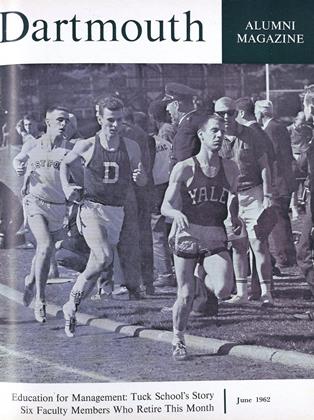TO THE EDITOR:
As Dartmouth's only living ex-director of admissions, I was glad to see Mr. Donald McKinlay's letter in your last issue. The persistent myth of individual "well-roundedness" as a supposed criterion for admission dies hard.
The reminder that diversity of inter- ests, skills, and talents in the undergrad- uate body has been an aim of Dartmouth admissions ever since this college took the pioneer step in selective, admissions in 1921 is also useful.
In addition to the references provided by Mr. McKinlay, readers with relatively limited time perspectives might also be referred to President Hopkins' convocation address in 1922, entitled "An Aristocracy of Brains," which produced a considerable dust-up at the time, here and abroad. Statements by President Hopkins, and since 1945 by President Dickey, contain many aspirations to excellence; and, with respect to applicants, excellence hopefully in more than one dimension. But careful readers will find no exhorta- tions by Dartmouth presidents in pursuit of individual "well-roundedness."
In a decade of work as director of admissions, I never heard anyone responsibly connected with admissions at any college espouse "well-roundedness" as a criterion of selection. The late Radcliffe Heermance, Princeton's director of admissions from 1921 to 1950, was credited with the statement almost twenty years ago that the quintessence of "well-roundedness" is the billiard ball. "It takes on a high polish," he is said to have said, "and is easily pushed around."
Few topics have been longer cherished by article-writers, orators and cocktail-party conversation-makers as a straw man for their passionate attack. This is not to say, however, that well-roundedness does not have its earnest advocates. You can find one at any university club bar. (This is one reason why admissions officers shun university club bars.)
Mr. McKinlay, who is one of the most admired in my circle of Dartmouth acquaintances, displays a sophistication in geometry approximately equal to my own when he appears to separate the question of radius from that of circumference. (Don, have you never heard of ?)
What I think Don McKinlay has in mind is a statement which he and I have heard Dartmouth's director of admissions, Eddie Chamberlain, attribute to Dartmouth's articulate coach of track, Elliot B. Noyes '32. This statement was about a particular candidate who showed no especially distinguishable qualifications for admission in a competitive situation. "This," Mr. Noyes is reported to have said, "is a very well-rounded man . . . but with a very short radius."
One wonders indeed who first dreamed up this odd notion that the symbol of desirability for college most resembles the symbol of zero.
One might also recall Mr. Chamber- lain's own satirical piece, published in the Fall 1954 issue of the College BoardReview. Entitled by the Review's editors as "The Chamberlain-Rorschach Master Card," it illustrated, within circular out- lines, the "well-rounded man" as vari- ously viewed by faculty, deans, coaches, and others. The resulting designs took on haunting forms which were distinctly non-spherical.
What do you say that we try to give "well-roundedness" a decent burial somewhere - say, back of Massachusetts Row, not too far from the grave of the splendidly angular Eleazar Wheelock under the new parking lot, if necessary?
 View Full Issue
View Full Issue
More From This Issue
-
 Feature
FeatureDays of Controversy: 1816-1819
June 1962 -
 Feature
FeatureEducation for Management
June 1962 By CARLA A. SYKES -
 Feature
FeatureA College-Church Partnership
June 1962 By CLIFF JORDAN '45 -
 Feature
FeatureSix Faculty Members to Retire
June 1962 -
 Feature
FeaturePsychologists Discuss World Tensions in a Conference Dedicating Gerry Hall
June 1962 -
 Class Notes
Class Notes1931
June 1962 By WILLARD C.WOLFF, WILLIAM T. WENDELL
ALBERT I. DICKERSON '30
-
 Article
ArticleHanover Holiday Plus Alumni College
May 1937 By ALBERT I. DICKERSON '30 -
 Books
BooksAN ACCOUNT OF CALLIGRAPHY PRINTING IN THE SIXTEENTH CENTURY
March 1940 By Albert I. Dickerson '30 -
 Article
ArticleA DAY WITH A TRAINEE
January 1944 By ALBERT I. DICKERSON '30 -
 Books
BooksNEVER SAY DIET.
November 1954 By ALBERT I. DICKERSON '30 -
 Article
ArticleValedictories to Retiring Class Agents
April 1942 By Harvey P. Hood II '18, Albert I. Dickerson '30 -
 Cover Story
Cover Story24th Alumni Fund Campaign
April 1939 By Luther S. Oakes '99, Edward K. Robinson '04, Fletcher R. Andrews '16, 2 more ...
Books
-
 Books
BooksFACULTY PUBLICATIONS
November 1917 -
 Books
BooksThe Graphic Arts in Belgium
November 1938 -
 Books
BooksJOURNALISM AND THE STUDENT PUBLICATION
June 1952 By Eric P. Kelly '06 -
 Books
BooksEDUCATION AND LIFE
January, 1931 By H. M. Dargan -
 Books
BooksLooking Back
April 1979 By R. H. R. -
 Books
BooksSPUN SEQUENCE.
July 1962 By RICHARD EBERHART '26

